#anarchy 101
Note
I noticed you have tagged posts ableist language on posts which I haven’t noticed the ableist language in. Sometimes in further reflection I can see why you have added that tag, and sometimes not. If you’ve ever got the time/inclination, could you explain some of the more nuanced ableist language usages?
sure thing! (and obviously, trigger warning for ableist language to follow)
I know many may feel I take a pretty radical stance, but i've studied enough linguistics to know how powerful the words we use can be, even when we don't intend it in that way. so I use the ableist language tag for when people are not being ableist but are using language which reinforces ableism. this can get a bit tricky as the people who are the subjects of ableist terms may often identify with or reclaim those terms, like calling someone a cripple is ableist, but many people self-identify as cripples, like the cripple punk movement.
I think they generally fall in three categories:
intelligence: stupid, idiot, moron, etc. intelligence and iq are not real, they're eugenicist myths and insulting people's intelligence only feeds these myths and serves the ruling class. build solidarity by seeing everyone as your equal. there is no moral value to having received a better or worse education than someone else. also many of these terms come directly from eugenics, such as their classifications of types or degrees of autism.
diagnoses: psycho, dumb, schizo, bipolar etc. these are real health conditions and i shouldn't have to explain why using them as insults is deeply offensive.
saneism: insane, crazy, mad, etc. the sane/insane dichotomy, if it was ever helpful, which I doubt, has been outdated for generations. there is no medical diagnosis of 'insane', there are hundreds of mental health conditions and an infinite number of combinations which we are barely beginning to understand. but none of them have or convey a moral value. using them as insults only stigmatizes those of us who have them, to the benefit of the ruling class and detriment of solidarity.
even if you are skeptical or attached to this language I'd challenge you to try not using it. you'll find it improves your vocabulary and your speaking and writing skills. not just that but it will deepen how you think about your fellow humans.
#dietspam#dietspam answers#tw ableist language#disability 101#anarchy 101#apologies to everyone who’s asked variations on this i never got back to
138 notes
·
View notes
Text
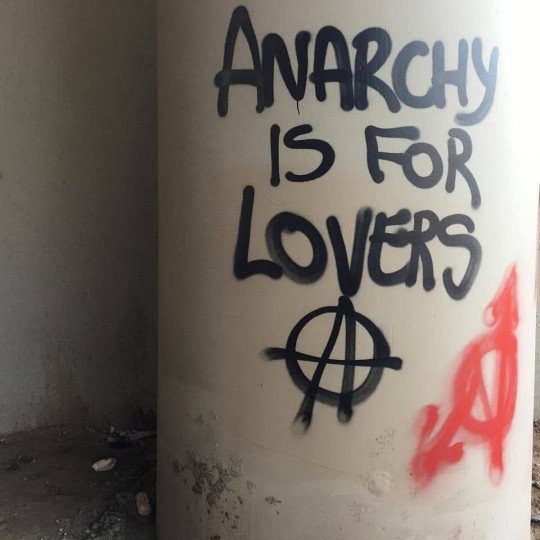
#art#graffiti#anarchy 101#anarchy#anarchist posters#anarchism#anarchist#161#1312#acab 1312#ausgov#politas#auspol#tasgov#taspol#neoliberal capitalism#australia#fuck neoliberals#anthony albanese#albanese government
24 notes
·
View notes
Text

#JakeReviewsItch
Anarcute
by Plug In Digital (Anarteam)
Price (US): $14.99
Included In: Bundle for Racial Justice and Equality
Genre: Action, Adventure
Pitch: Cute anarchy. Adorable animals rise up against robo-fascists, throwing anything they can lift at cops, toppling buildings, and smashing the state any way they can in the name of liberation.
Your power is the group's power. You control not one character, but an entire mob, kind of like Pikmin or The Wonderful 101, but not really. It's its own thing, with short, action-packed levels that are meant to be replayed to get better speed and efficiency ratings.
My expectations: Played it. Loved it. But if I have to play a little more for this review, I guess I will...
Review:
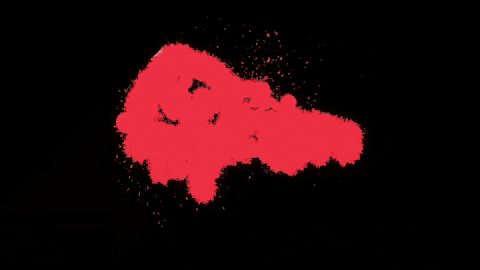
Let’s start with the bad:
Aracute has major controller issues on PC. Known, widespread problems.

I quickly remembered that they’re the reason I quit playing this game. After literally hours of trying every conceivable solution, I discovered (entirely by accident!) that holding the Alt key while launching the application (or immediately after, depending on your launch method) brings up the Unity configuration tool, which fixed my problems.
My advice: Play Anarcute on console.
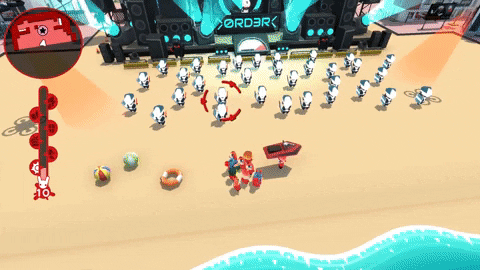
Because PC-specific issues aside, this game is a delight. There’s a primal, Katamari thrill to seeing the mob of cute, li’l critters grow larger and more capable of toppling fascism. Alone, we are weak. Together, we drop buildings on cops and throw cars at their helicopters.

It plays almost like a hybrid brawler/strategy strategy game. The mass of animals rolls and attacks like a single character. Charging headlong into battle without a plan is a viable approach if you simply want to reach the end of each stage, but the real fun is in mastery. S-ranks are reserved for those who learn the level. Each mission has been carefully crafted so that all enemies can be defeated with minimal losses in two or three minutes.

+ A physics-y, strategic brawler thing! Familiar and unique, all at once, it's a joy simply to tear this stupid city down.
+ Cute, cute, cute! And anarchy! At the same time! It's not some fake-out, Happy Tree Friends thing. It's anarchy, and it is very, very cute. In a just world, Anarcute toys would be everywhere. In our wicked world, I can't even find knock-offs on Etsy.
+ Score chasing that's actually fun and highlights just how much thought went into each level's design. Scores are given for mob size, enemies defeated and time. Get an S in any two, and you get an S for the level, no matter how bad the other score is. I love that.
+ A soundtrack that sounds like someone took The Go! Team and made it cuter.
– Awful, awful controller issues.
– Controlling a mob is hard. Obviously. But it would be nice if my guys didn't keep bumping into the deadly lasers. I need healthy rioters!
– Some of the special moves are a little finicky. By the time I'm ready to stomp, I don't need it, or it happens so quickly that I waste it trying to dodge an attack
🧡🧡🧡🧡🤍
Bottom Line: PC isn't an ideal way to play Anarcute, but the game is such a joyful mix of fresh ideas, familiar ideas, strategic planning, anarchic action, and cuteness that I was willing to waste half my day trying to make it work.
There's something here for everybody. Play it on a console if you can.
#JakeReviewsItch is a series of daily game reviews. You can learn more here. You can also browse past reviews...
• By name
• By rating
• By genre
#Anarcute#Plug In Digital#Anarteam#Cute Animals#Anarchy#Riot#Fascism#Antifa#Brawler#Pikmin#The Wonderful 101#Katamari Damacy#Little King's Story#Tinykin#Overlord#JakeReviewsItch#Computer Games#Video Games#Indie Games#Game Review#Nintendo Switch#Bundle for Racial Justice and Equality
1 note
·
View note
Text
Punk 101: A History of Battle Jackets
Battle Jackets have a long and interesting history in general, not limited only to punk. Today we see them as a reflection of the wearer, they are a form of self expression and affiliation.
Battle jackets can trace their origins back to WWII American pilots who would decorate their flight suits and bomber jackets with their squadron's insignia patches. They were jackets that allowed pilots to easily recognize each other and instilled a sense of pride and community in their owners. This is also where the term 'battle jacket' comes from.
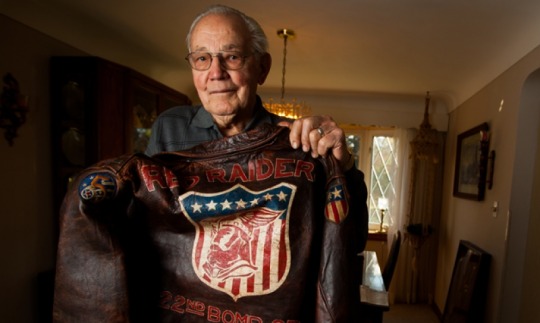
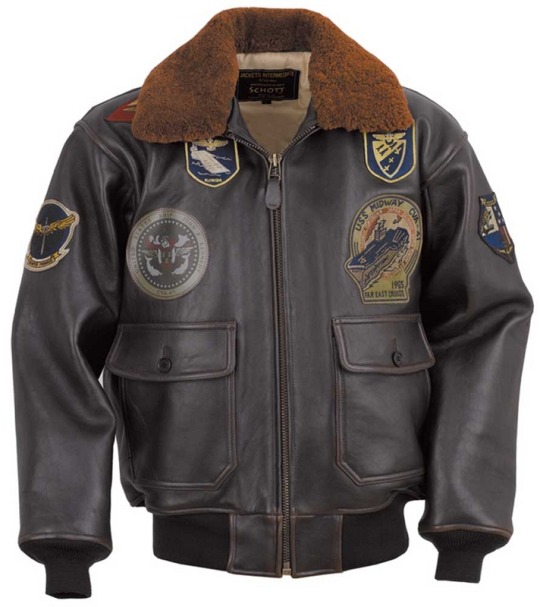
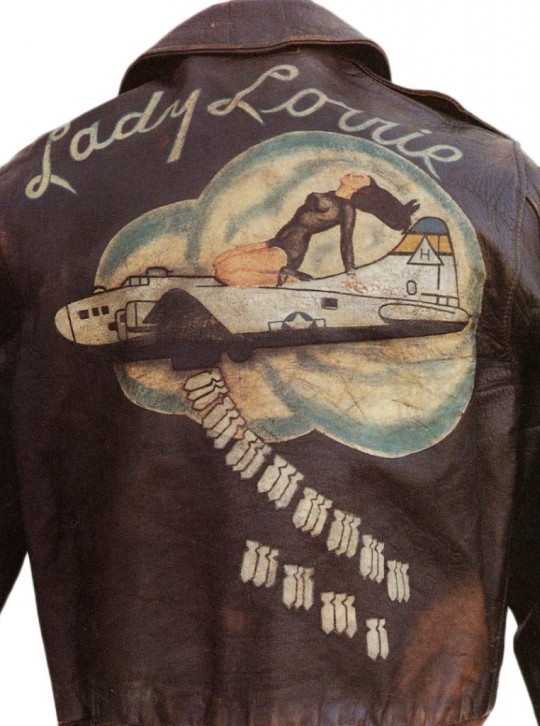
After the war was over, pilots returned home and many found joy in the speed and excitement of motorcycles. Biker clubs were formed, and thus, biker culture as well. Pilots often used their bomber jackets while riding because of the protection they offered, though the sleeves were usually removed due to how they restricted movement. Jackets got decorated with club/gang logos to represent their wearer's affiliation, much like the insignia patches. As biker clubs grew, members without a pilot history often used leather or denim jackets to showcase their affiliations. There is a LOT more to biker jacket history, but this is what's really relevant to punk jackets.
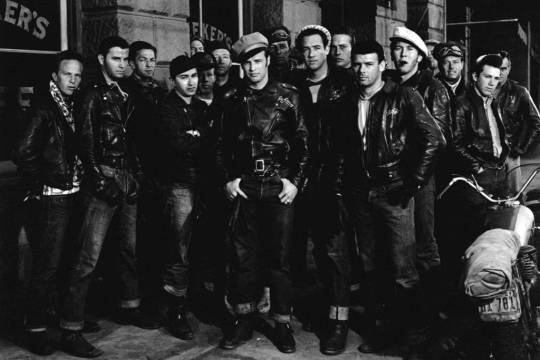
In the 60s, two different cultures evolved in the UK. The first is The Mods, known for listening to modern jazz and riding scooters (supposedly their name comes from the modern jazz thing. I would not have been surprised if it was from 'modification' considering the seeming obsession to keep adding mirrors and lights to their scooters). The other group was The Rockers who were known for listening to 50s rock and riding motorcycles. While the groups strongly disliked each other, they both decorated their jackets in ways that influenced punk's jacket scene. The Mods often added pictures, paintings, and patches to theirs, while The Rockers were more likely to be seen sporting spikes and studs. (Not to say that those things were strictly limited to each side - just what was more common)
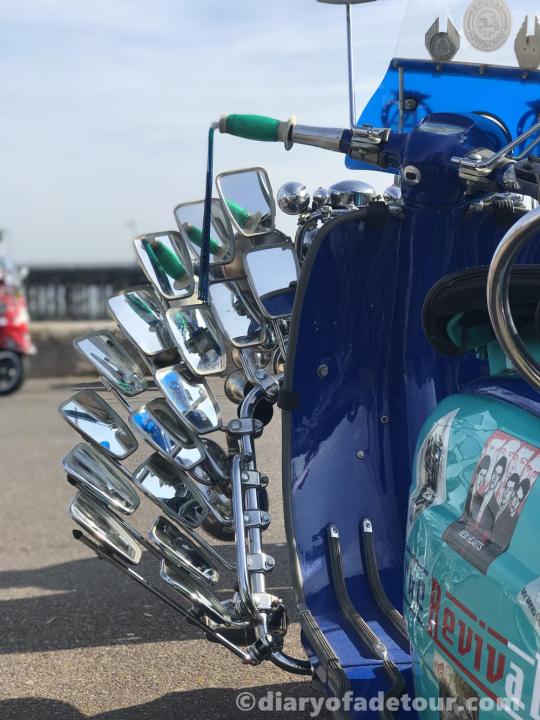
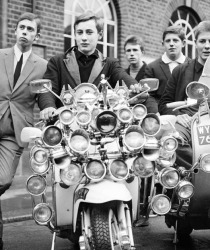
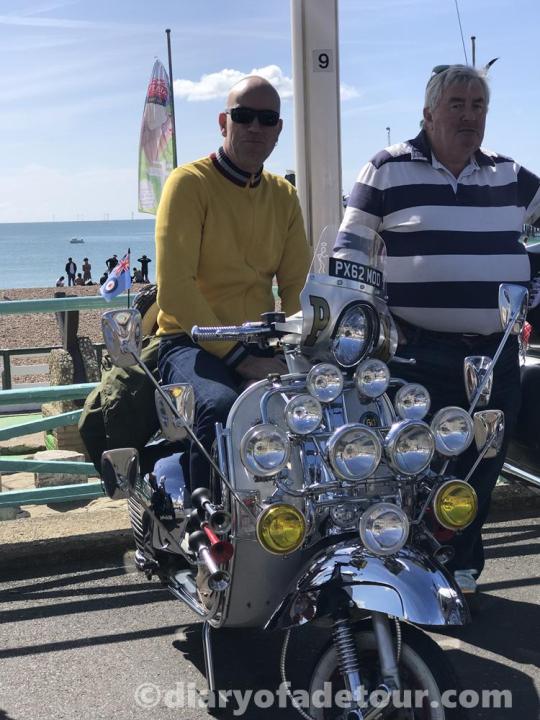

The following decade (the 70s), the two branches came together as various music subgenres collided and formed. Punk was among the genres formed, and the culture surrounding it was one of the first non-gang or club related groups to decorate their jackets. Taking influence from both The Mods and The Rockers, the characteristic punk look was formed, and intended to be a Fuck You to societal norms. In the earliest days, punk jackets were mostly covered in band patches, much like modern heavy metal jackets. As punk evolved into what we know it as today, with notes of anti-establishment and anarchy, it became more common to see political patches right along side the band ones.
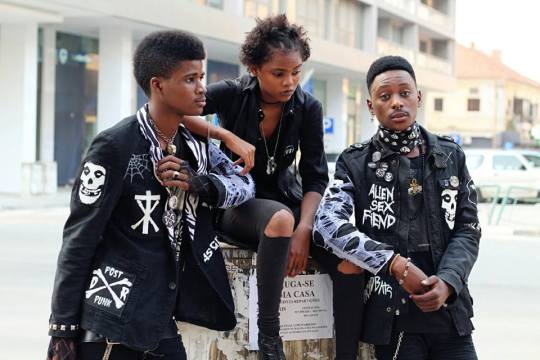
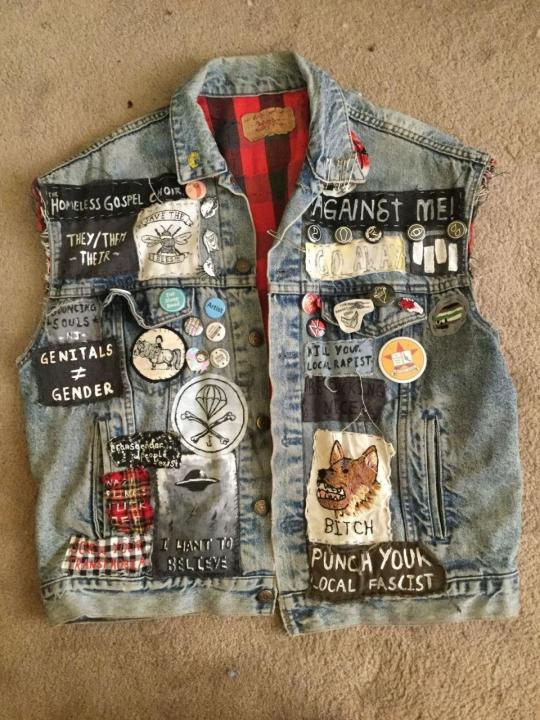
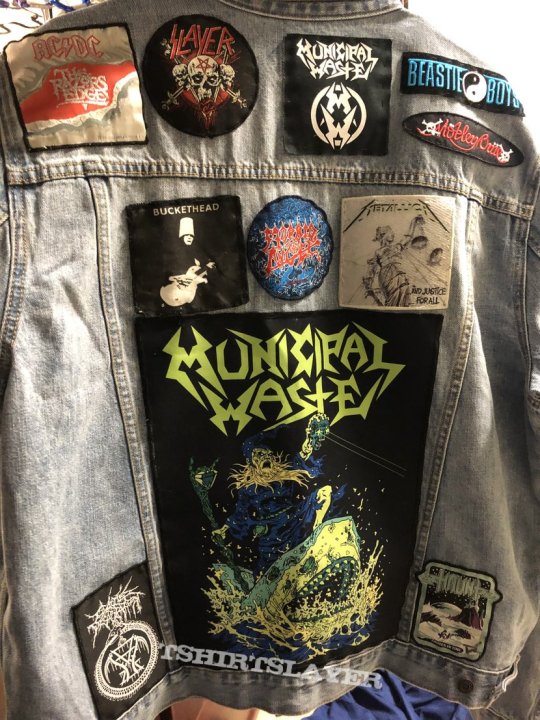
Today's jackets are a personal statement. the bands you like, your interests, political statements. They are a symbol of individuality and rebellion against society. They are a physical representation of YOU and your history with punk culture. This is why it is so important within punk culture to make your own jacket or have someone help who can customize it to you. You are not a generic human off the rack, you have lived a life, had your own battles, have your own personality, and have your own history. A premade, mass produced jacket won't showcase any of that or really truly represent the individuality of 'you'.
#punk 101#I honestly intended this to be more 'how to make' and 'things to know' but I got a little to into the history research#i'm sorry i'll do another one on that stuff#just not tonight I'm tired#battle jacket#patch jacket#punk jacket
2K notes
·
View notes
Text
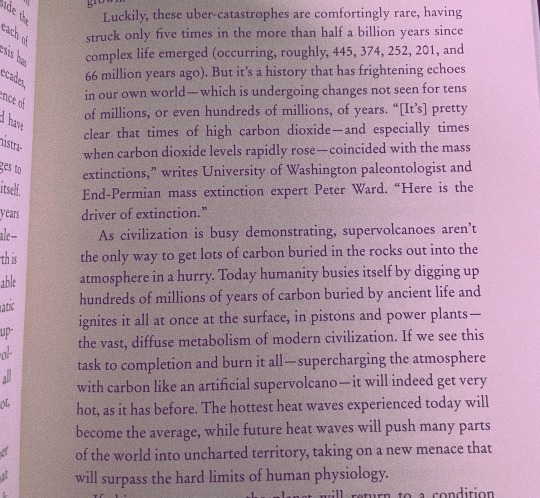
Source: The Ends of The World by Peter Brannen
#life#love#sustainability#universe#wicked witch#intersectional#green anarchy#anti capitalist#books#reading#summer reading#apocalypse#mass extinction#co2 emissions#climate change#earth science#earth science 101#the ends of the world#i am art#the wicked witch of the east
1 note
·
View note
Text
The Hobie Brown Punk Playbook - Anarchism & Hobie's Arc
A short series where I analyze the political, historical, musical, and romantic influences of Hobie Brown, and how it affects his arc, design, and character.
1) Anarchism 101 / 2) Punk 101 / 3) Hobie Characterization Guide (How to Write Hobie) /4) Punk & Hobie's Design / 5) Romance in the 70's
_______________________________________________
Why Hobie's Arc is the perfect metaphor for Anarchy and Anti-Establishment:
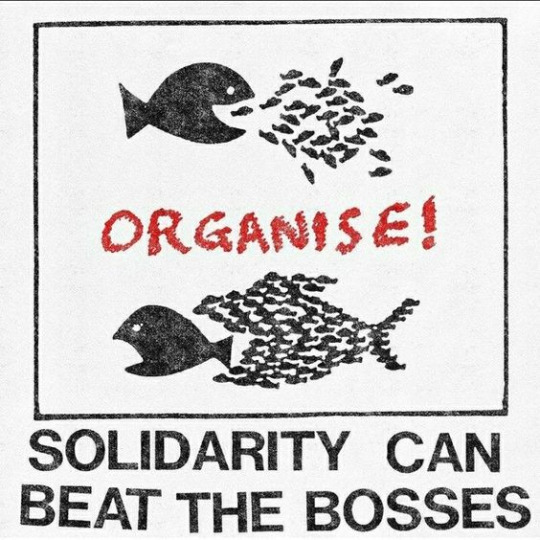
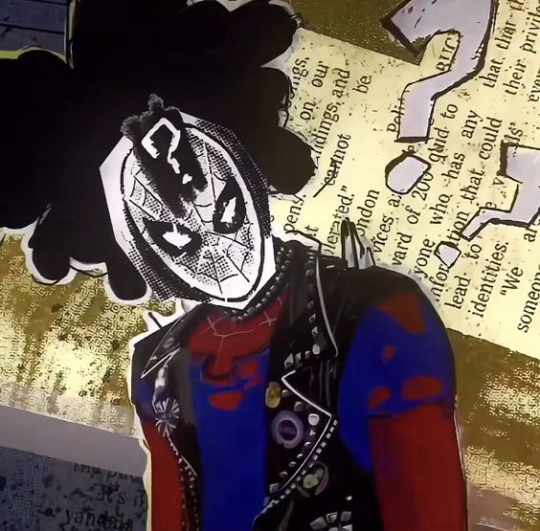
What is Anarchism?
What's an anarchist, and what makes Hobie one?
In most places, Anarchism is defined as:
a political theory advocating the abolition of hierarchical government and the organization of society on a voluntary, cooperative basis without recourse to force or compulsion.
Which means that, as an Anarchist, Hobie believes that all forms of authority that involves a hierarchal power should be abolished and destroyed.
Anarchists opposes any and all power structures in which a single person, class, or entity rules over a body of people.
Anarchism is a thought system that, at it's core, is anti-government, anti-monarchy and anti-cop. It's goal is to protect and highlight the importance of equality and community but also freedom and individuality as well.
Although many people assume anarchy is about chaos - and denying any and all structures - if anything, it’s actually the opposite.
Anarchy is about balance -
When we look at the definition of Anarchy, we can see two complimentary ideas. ______
The first is the 'advocating the abolition of hierarchical government' - which is the sentiment Anarchy is most known for. It's the opposition of power structures in which one class or group rules or gains privilege over another - cops and civilians, the government and citizens, Spider-people and the multiverse, Miguel and the Spider-people...etc.
For the purposes of this post, I'll call it the First Pillar of Anarchism, and it's the basis for one of Anarchism's foundational beliefs: direct action.
(Which Hobie is the king of)
The second idea is one often overlooked, but just as important, and I'll talk about how much it colors Hobie's characterization in a second.
The organization of society on a voluntary, cooperative basis. Anarchists believe in equality, and the power of the collective and working together as a unanimous unit.
But they also believe in freedom of choice, and the choice to be independent.
When working in large cooperative groups, there is the risk of a shared identity that may stifle or assimilate it's members. Just as much as Anarchists believe in unity and equality, they also believe that a society - or any group - should be voluntary. And that sticking out from the pack is okay and even encouraged.
They believe people reserve the right to not participate at all, and that it is their right to differ and challenge the pack, if they so want to.
In the perfect anarchist world and situation (in my opinion,) - No one rules over the collective, and the collective rules over no one.
When you put those two together you get Anarchy. A balance of community and self.
And although we don't live in an anarchist utopia, Anarchists are people who live life fighting for the equality and unity of others, as well as their independence and freedom to be who they are outside of others.
In short, An Anarchist is someone who believes in equality, community, freethinking, and most of all freedom of choice.
Starting to sound like anyone we know?
What makes Hobie the perfect Anarchist?

Hobie is Anarchy personified. Literally.
Hear me out.
When we look at the definition of Anarchism next to Hobie's actions, behavior, and beliefs - we can see the writers created Hobie and his arc to be anarchy in it's purest form.
Anarchy is described as:
a political theory advocating the abolition of hierarchical government and the organization of society on a voluntary, cooperative basis without recourse to force or compulsion.
Hobie only has roughly ten minutes of screentime, and I wrote (here) exactly how the writers squeeze meaning into (quite literally) every-line he has.
In every line and frame the writers are intent on having Hobie move towards the 2 specific goals and motives on Anarchism, backed by his punk and anarchist morals.
Firstly, he approaches Miles to advocate the abolition of Miguel's hierarchical society, emotionally and mentally encouraging Miles to oppose his authority.
All of Hobie's speaking lines are dedicated to this purpose - becoming an ally to Miles (and other Spider-people) and inspiring rebellion.
This is reflected by his opposition to the ideas of anomalies, and Miguel's rule.
I just wanna highlight, that when Hobie meets Miles - neither he nor Miles are aware that Miles intends to avoid his canon event.
At the point of their meeting, Hobie only knows that Miles has disrupted Pavitr's canon event, and that Miles himself in an anomaly.
Hobie opposes Miguel's hierachial society, his rule over the timeline and multiverse, and his use of force and threats of violence. By advocating for the abolition of Miguel's society and urging Miles' rebellion against Miguel, Hobie is directly engaging in the first pillar of Anarchism.
When Hobie's efforts pay off and Miles escapes Society capture, he's goal changes toward the second pillar.
Hobie recognizes Spider-Society does not operate on a voluntary, cooperative basis - as their canon events are mandatory by force and compulsion.
And because of this, he thinks ahead and uses his self-made watches in order for him, Gwen, and Miles to exercise their right of choice.
From the moment he quits, all of Hobie's behavior is dedicated to this purpose - getting Miles and Gwen out of the society, and helping Miles avoid his incoming canon event.
The Spider-Society is everything Anarchy stands against.
Anarchy stresses volunteered and cooperative effort for a reason.
I spoke earlier about how in cooperative groups, their is a risk of a shared identity within a group that forces assimilation and cooperation.
And Spider-Society is the perfect, and most literal example of this.
Spider-people are (literally) the 'same person'. Those in the Society are united by the shared identity of being Spider-people. This identity is mandatory for entry - and because Miguel ties canon events to the identity of a Spider-person, the canon events become compulsory and mandatory as well.
I mentioned before that at the time of meeting Miles, both he and Miles had no idea about Mile's incoming canon event. He, like Miles, only learns this when Miles announces that his dad is about to be captain - in front of Miguel.
When Miles escapes and Hobie quits, from that point on - despite the fact he's not fully shown on screen again - Hobie still manages to act on and stand by Anarchism. From then on, every single one of his actions is dedicated to opposing the involuntary, compulsory nature of canon and canon events.
Hobie interferes with the compulsive nature of canon by approaching Gwen's dad and speaking with him. He interferes with the involuntary nature of the Society's membership, by leaving Gwen the watch that allows her and Peter B. to leave, going AWOL.
___________________________________________________
As a character, Hobie is what is considered a insurgent. His purpose in the story and Miles' life is to inspire action and rebellion within him and the system.
And at his core, Hobie is meant to be a character that's meant to empower others - especially at their lowest point. That's what Anarchism, and Punk, is about.
Hobie is Anarchy personified.
Every one of his motives and lines are dedicated to it's purpose. Whether it's his first scene disarming Miles with humor and allyship, or him deliberately copying Society technology.
With every word and frame, Hobie inspires rebellion - defying hierarchy, and empowering choice.
With the people closest to them, he literally put the power of choice in their hands, whether it be Miles' palms, or the watch Gwen held.
In the battle against the Spider-Society - an organization of hierarchy, control, compulsion, and force - the writers chose to have Hobie's weapon of choice be Anarchy.
And it's really clear they see Anarchy for what it is - a system and tool of empowerment, compassion, and freedom.
And honestly, I can't think of any other words that can describe Hobie better (or than hot).
Hobie Brown is literally walking Anarchy idc idc you can't tell me different bye.
Find Part 2 - Punk 101 here!
__________
also have a couple more ideas and drafts of these, mainly examining: Punk and what makes Hobie punk, his design inspiration and fashion, the 70s history behind him, romance in the 70s, etc so uh yeah
#wake up hun new analysis just dropped#I love ANARCHY AND COMPASSION AND CARING FOR OTHERS#atsv analysis#hobie brown#spider punk#spiderpunk#across the spider verse#atsv#Miles Morales#Gwen Stacy#Miguel o'hara#spider-gwen#spider man#spiderman#marvel#long post#Hobie Brown Punk Playbook
746 notes
·
View notes
Text

Anarchism 101
The logic behind the arguments in favor of government/law/authority is very weak.
If humans were so wild, violent, savage, and inherently evil, then no laws could stop them and society itself wouldn't be possible. If humans are good enough to be able to form a society, then no law is needed and we'll do much better without laws. This is the case.
'Social contract theory' is nonsense, a lie; no one has signed any such contracts to form society. Society exists because of our social inclinations and needs, because we're naturally social beings.
IF humans were inherently bad, who thought it was a good idea to have a bad human ruled by another bad human, and who thought this would magically give rise to good?
But actually humans are not inherently bad, and the "human nature is evil" argument is always used by charlatans those with vested interests.
491 notes
·
View notes
Text
𝗝𝗔𝗡𝗨𝗔𝗥𝗬 𝟮𝟬𝟮𝟰 𝗙𝗜𝗖 𝗥𝗘𝗖𝗦 (𝟮)
༝༚༝༚ = Black/POC Works ⎢ 24’ Fic Rec M.List
ONE CHICAGO:
Connor Rhodes
Mine — @halsteadlover
Dream Partners — @sjhhemmings
Comfortable — @kiddbegins
Babysitting 101 — @iamwhoami
Emergency Love — @callsign-dexter
Plan — @lcvesjj
Jay Halstead
Kiss It, Kiss It Better Baby — @halsteadlover
Haunted — ^
Night Struggles — ^
Our Little Family — ^
A New Milestone — ^
Under Fire — ^
Shadows From the Past — ^
“Ladies love a guys who’s good with kids” ⎢ Part 2 — @poppadom0912
Uncle and Niece (Platonic) — ^
Love on Ice — ^
30 Hours — @dandelionfairyyy
Halstead’s Favorite Duo — @ballarkeselection
Exciting — @fangirlfrom-hell
CPD Gala — @hereforhalstead
Home — @deanstead
The Way You Are — @loislane41319

PEAKY BLINDERS:
Alfie Solomons
Interviews for New Beginnings: Part 7 — @muneca-lemon-steppa
Request 24 — @fandom-puff
Living with Alfie Solomons — @heavencanbeaprisontoo
The Silent Treatment — @warnersister
Luca Changretta
Living with Luca HCs — @heavencanbeaprisontoo
Thomas Shelby
Me Time — @garrison-girl-08
Daddy’s Princess — ^
Tommy Convincing His Wife to Stop Being Angry — @wutheringcaterpillar
Of Bending and Breaking — @call-sign-shark
Mr. Forgettable — @mrkdvidal1989
Time After Time Chapter 14 — @all-mirth-no-matter
Wedding Day — @cillianthinker
When She Laughs, The Heavens Hum a Stun Gun Lullaby — @saintmuses

SONS OF ANARCHY:
Filip “Chibs” Telford
The Last to Know — @kdogreads
Imagine Being Chibs’ Old Lady ⎢ Part 2 — ^
Imagine Taking In the Teller Boys With Chibs — ^
Very Soon — ^
My Dove — ^
Ruin — @bullet-prooflove
No Words — ^
Teach Me How to Ride — @violentdelightsandviolentends
Pussyfooting — @indifferent-depravity
Happy Lowman
Violent Little Thing — @fanficimagery
Your Family Disapproving of Happy — @imagineredwood
Angst to Fluff Prompts — @ravennaortiz
Flash Fic Request — @withmyteeth
Cocoa Wars — @darqchilddaydreamz
Miss Me — @marvelous-slut
Just for Today — @obsessedasusual
Jackson “Jax” Teller
Relentless — @violentdelightsandviolentends
Heatwave — ^
Insomnia — @spaghettificationandpretzels
You Aren’t Meant to Be Back Until Christmas Eve — @rebelwrites
Only Mine — @thisreadswhatever
Fluff Prompt — @youvebeenlivingfictional
I’m Sorry — @pumpkin-writes
Rescued — @garbinge
Harry “Opie” Winston
Nowhere to Be — @drabbles-mc
Stolen Sweater — @i'm-just-a-mississippi-girl
Good Honest Work — @spaghettificationandpretzels
81 notes
·
View notes
Text
Anarchy 101
Hobie Brown, standing in front of a blackboard that he repurposed from somewhere: OK, my students. Today, we will be learning about the most effective ways to disrupt authority. Any questions before we begin?
Miles: Why do Gwen, Pavitr and I all have to share a table at the back while Mayday has her high chair right at the front?
Hobie: She's my star pupil. Watch her and learn.
Hobart: *releases Mayday into the control room while the class watches*
Mayday: *crawls up Miguel and pukes onto him*
Miguel: *snarls, put her on the floor and leaves to change*
Hobie: That's what you do.
Pavitr: Puke on Miguel? But I haven't eaten anything.
Hobart: I meant disrupt authority.
Miles: I have spray paint. Wanna try giving the place a makeover while he's gone?
Hobie Brown: I think I have another star pupil.
#spiderman across the spiderverse#miles morales#hobie brown#pavitr prabhakar#may day#spider gwen#anarchy#incorrect quotes#i wrote hobie's name differently every time because he doesn't believe in consistency
171 notes
·
View notes
Text
It's very sweet about CS Lewis to idiotproof Paradise Lost against atheists. He didn't have to do that. He was a Christian writer in a Christian society and I assume he could have gotten away with just talking to other Christians about it and ignoring annoying people who wrongly read subversion into Milton. Instead he gives us a Christianity 101 chapter in A Preface to Paradise Lost and says, "this is the theological canon of the church, and here is how Milton hews to it again and again".
So now I think I understand Christianity. Maybe?
CS Lewis, explaining the canonical beliefs: Everything in nature is intrinsically good. Bad things happen when conscious creatures become "more interested in itself than in God", or assumes it can exist independently of God, as when Milton's Satan says that he is "self-begot".
me: Just for fun, let me enumerate the possible answers to 'who begot us?' – (1) conscious supreme being – e.g. Christian God, (2) our parents – e.g. Confucianism, (3) the self, (4) the weight of human history – humanity co-creating itself by maintaining a matrix of culture, (5) Nature – non-conscious but still revered, e.g. planet worship / I hecking love science, (6) null answer – non-conscious material processes.
Lewis: God knows in advance that some conscious entities will voluntarily make themselves bad and also knows what good use He will make of their badness. As [Milton's] angels point out, whoever tries to rebel against God produces the result opposite to his intention. At the end of the poem Adam is astonished at the power 'that all this good of evil shall produce'. This is the exact reverse of the programme Satan had envisaged in Book I, when he hoped, if God attempted any good through him, to 'pervert that end'; instead he is allowed to do all the evil he wants and finds that he has produced good. Those who will not be God's sons become His tools.
me: That's such beautiful cope! I've heard the badly-articulated versions of that Christian belief but it turns out I'm unprincipled and like it when you, Charisma Stat Lewis, say it.
me: It's also hard not to speculate that this belief is more adaptive in a world with e.g. a 50% child mortality rate.
Lewis: Also, The apple wasn't magic. THE APPLE WASN'T MAGIC. The only point of forbidding it was to instill obedience. The disobedience was so heinous precisely because obedience was so easy.
me: it was a shit test
Lewis: The Fall consisted of man's disobedience to his superior and was punished by man's loss of authority over his inferiors – chiefly over his passions and his physical organism. "Man has called for anarchy: God lets him have it." After the Fall, understanding ceased to rule and the will did not listen to understanding.
me: okay so what about the physical organism
Lewis: Man used to control his erections before the Fall
me: what
Lewis: That's right. No accidental boners. No morning wood. No dead bedroom subreddits. You can clench your fist without being angry and you can be angry without clench your fist. The will controls the fist. The sexual organs used to be like that.
me: That follows splendidly from "man was punished by the passions overruling the will" and yet I wasn't expecting that at all. Probably because I'm female? I annotated your "the will did not listen to understanding" with "we didn't have akrasia before the fall", because akrasia is a big problem for me. But being horny isn't.
me: I mean, obviously some women are really horny and causes them to act in unwise ways, and some men aren't horny. But "single men under age 25 are the most societal-problem-causing demographic" is well known, and even outside that age range, men seem to be, like, "cursed with horny" in a way that requires managing & makes them miserable on a day to day basis... so it makes sense that male interpreters would identify that with the Fall. It's conceptually congruent in a way "the Fall caused childbirth to be painful" isn't.
Lewis: Anyway, the Fall – people overcomplicated it. The apple is just an apple. It's not an allegory. The Fall consisted of Disobedience – doing what your superiors told you not to do – and resulted from Pride, which is forgetting your place. This is what the Church has always taught. Milton states it in the very first line of his poem and all his characters reiterate it from every possible point of view. Don't read false emphases into Milton! This is what he is saying: obedience to the will of God will make you happy and disobedience will make you miserable.
me: Well, obviously you know that your modern reader doesn't like this. You're pleasantly cognizant of atheist readers who are into self-governance and equality.
Lewis: The modern idea that we can choose between hierarchy and equality is not quite right. The real alternative to hierarchy is tyranny. If you will not have authority you will find yourself obeying brute force.
me: I simultaneously have a suspicious-resistant feeling and the perception that, when people in my milieu disagree with this, your view is the baseline from which we deviate minorly. Any form of functional social arrangement is going to have something that looks like authority and obedience.
Lewis: Understand this: Milton's poem belongs to a hierarchical conception of the universe where everything except God has some natural superior and everything except dead matter has some natural inferior. Superiors should rule over inferiors. When Milton protests an instance of rule (he was against the monarchy of the Stuarts) he is disagreeing that the Stuarts are superior while still thinking that hierarchy is cosmically good. The justice or injustice of any given instance of rule depends wholly on the nature of the parties, not on any social contract.
me: I have little respect for Confucianism because it strikes me as so overtly a system of thought with no internal merit or wisdom on the micro, whose only function is to make society run on the macro. (I'm sorry to say "only" there, because that's a big function.) What you describe has the same feel. This isn't a great label for it, but I'd call both Confucianism and Christian hierarchy 'biological philosophies', in that of course this is the philosophy that materially deprived apes who want both power and stability would equilibriate on: a system of subjugation and cope. The hierarchical conception itself is "understanding ceasing to rule".
Lewis: [Lewis would doubtless totally own me. But he doesn't directly address this in anything I've read by him, and I can't simulate him in enough detail to generate his response.]
143 notes
·
View notes
Note
hi!! over the past year or so, i’ve been radicalizing leftwards (does that make sense?), and while i do like to say that i have a pretty good understanding of things like socialism and communism and such, one thing i haven’t really been able to figure out is what anarchism is and how it works. like, i get the basic idea, but what with google being google and most people on breadtube not being anarchist, it’s definitely not as easy to research as socialism.
anyways, tl;dr: what defines anarchism and how does it work?
thanks in advance! have a cookie 🍪
"Anarchism asserts the possibility of an organization without discipline, fear, or punishment, and without the pressure of poverty: a new social organism which will make an end to the terrible struggle for the means of existence,—the savage struggle which undermines the finest qualities in man, and ever widens the social abyss. In short, Anarchism strives towards a social organization which will establish well-being for all."
leftward ho! thanks for writing. these questions are always difficult to answer because i don’t know where you’re coming from on your personal journey. but i’ll try to answer some of the basics and recommend some good resources to start with.
first of all, there are many anarchisms and if you ask three anarchists you’ll get five opinions. but probably the most prevalent form of anarchism is anarcho-communism, so while i’ll try to talk broadly from a general anarchist position, much of it be from an anarchocommunist perspective for simplicity’s sake.

at it’s most basic, anarchism is an opposition to hierarchy, to one person having control over another. it is a radical commitment to compassion and absolute freedom. like communists, anarchists want a moneyless, stateless, and classless society. unlike leninists, who falsely claim to be communists, we know that there has never been a good state, and never can be. they are by their very nature oppressive, and cannot be used as a means to an end to achieve communism. no group or individual can wield that much power over others and not become corrupted by it. absolute power corrupts absolutely, etc. so while we are committed to the fight against capitalism, we are also committed to the fight against the state. they are intertwined and must be defeated simultaneously. so we believe in the abolition of all government and the organization of society on a voluntary, cooperative basis without recourse to force or compulsion, and the abolition of money and private property, as the best way to ensure the basic and higher needs of everyone are met.
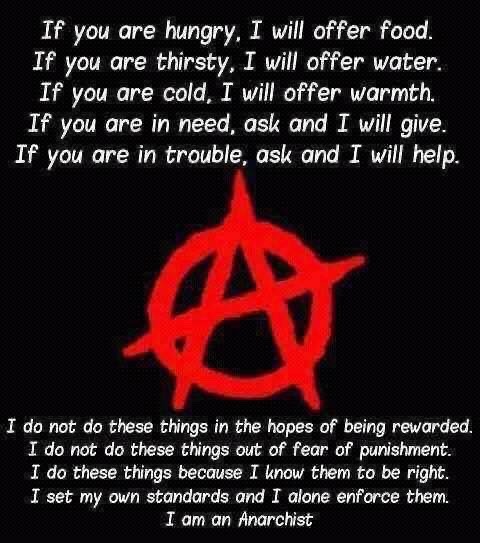
if you haven’t read it yet, the wikipedia article for anarchism is actually a pretty good place to start:
Anarchism is a political philosophy and movement that is skeptical of all justifications for authority and seeks to abolish the institutions they claim maintain unnecessary coercion and hierarchy, typically including, though not necessarily limited to, the state[1] and capitalism. Anarchism advocates for the replacement of the state with stateless societies or other forms of free associations. As a historically left-wing movement, usually placed on the farthest left of the political spectrum, it is usually described alongside communalism and libertarian Marxism as the libertarian wing (libertarian socialism) of the socialist movement.
Humans lived in societies without formal hierarchies long before the establishment of formal states, realms, or empires. With the rise of organised hierarchical bodies, scepticism toward authority also rose. Although traces of anarchist thought are found throughout history, modern anarchism emerged from the Enlightenment. During the latter half of the 19th and the first decades of the 20th century, the anarchist movement flourished in most parts of the world and had a significant role in workers' struggles for emancipation. Various anarchist schools of thought formed during this period. Anarchists have taken part in several revolutions, most notably in the Paris Commune, the Russian Civil War and the Spanish Civil War, whose end marked the end of the classical era of anarchism. In the last decades of the 20th and into the 21st century, the anarchist movement has been resurgent once more.
Anarchism employs a diversity of tactics in order to meet its ideal ends which can be broadly separated into revolutionary and evolutionary tactics; there is significant overlap between the two, which are merely descriptive. Revolutionary tactics aim to bring down authority and state, having taken a violent turn in the past, while evolutionary tactics aim to prefigure what an anarchist society would be like. Anarchist thought, criticism, and praxis have played a part in diverse areas of human society.
https://en.wikipedia.org/wiki/Anarchism
i don’t know how much original theory you’ve read before, but i’ll give some reading recs. personally i’m a big fan of peter kropotkin, and found the conquest of bread to be a breath of fresh air after studying marx for years. others have recommended starting with errico malatesta’s anarchy or peter gelderloos’ anarchy works. and zoe baker (anarchopac) is excellent if videos or tweets are more your speed.
https://enoughisenough14.org/2019/06/10/anarchism-a-very-short-introduction-by-colin-ward/
getting involved masterpost
hopefully that’s enough to get you started but please feel free to ask questions, and there are many more knowledgable people here who can help as well.
2K notes
·
View notes
Text
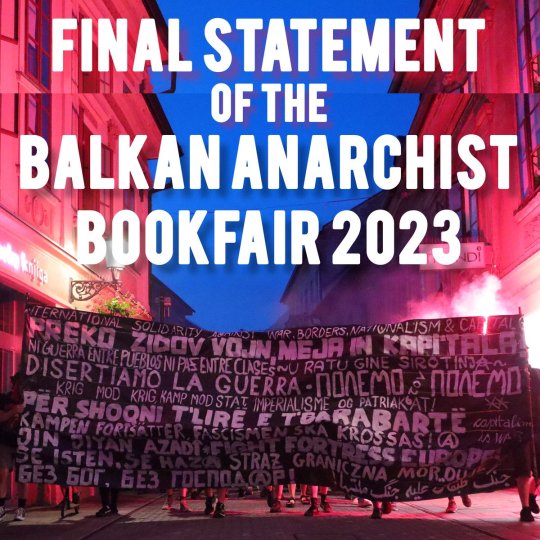
"We declare that it is necessary to create an alternative, emancipatory vision of the world, one that opposes the numbing effect of the normalisation and banalisation of war."
Read, share, discuss, organize!
https://bird.makeup/users/ainfoshop/statuses/1681559516343566336
@radicalgraff @antifainternational @kropotkindersurprise @anarchistmemecollective
#balkan#anarchist#book fair#organise#organize#161#1312#books#book#literature#antifascista#antifascist black metal#antifascist#antifascism#antifa#anarchist posters#anarchy#anarchism#anarchy 101#anarchocommunism#anarcho syndicalism#anarchofeminism#anarchopunk#anarchoqueer#antifascist action#antifaschistische aktion#antiauthoritarian#antinationalism#antinazis#antinationalist
3 notes
·
View notes
Text
Greek Gods 101: Dysnomia
Dysnomia is a goddess of lawlessness and poor civil order. Excluding the universal offerings, some common offerings include:
Symbols of Anarchy
Law Books, Papers, Pamphlets, Etc.
Desecrated Religious Symbols, Lawful Symbols (like a police badge), Etc.
Graffiti Photos or Art
Drugs, Weapons, or Other Illegal Items
Written Rules and Expectations
For devotional acts, some activities that can be done for her include:
Breaking Laws
Stealing
Learning About Local Laws
Learning About Unlawful Laws
Learning About Police Brutality and Other Law-Related Injustices
Vandalizing
She is not celebrated in any Athenian holidays.
Note: I do not condone nor encourage any of the offerings or devotional acts listed here.
#dysnomia#dysnomia goddess#dysnomia deity#read the tags for an explanation about the note btw#deities#hellenism#helpol#hellenic#hellenic pagan#hellenic polytheism#hellenic community#hellenic polytheist#hellenic deities#the note is bc i don’t wanna be connected to your stunts#but go ham#if you cannot escape capitalism through buying things there’s always stealing#huh what who said that#certainly not me
47 notes
·
View notes
Note
hey im a baby punk, and i just started making a patch jacket (is that what its called?), its only a couple roller derby patches and a book quote beaded on right now, but what would be some good (preferably subtle, cos parents :\ ) things to add?
-ghostflower
0) HI THIS HAS BEEN SITTING IN MY DRAFTS AND I DONT KNOW WHY IM SO SORRY
1) I absolutely love the name ghostflower
2) patch jacket and battle jacket are interchangeable for the most part. Battle jackets have a bit of history behind them stemming from WW2 (I have a Punk 101 post saved in my drafts about this actually), but in 95% of cases I’d argue patch jacket and battle jacket is interchangeable
3) THINGS TO ADD!!!
I’ve made a post about this before too but hey everyones always looking for more ideas, right?
Sew on random but meaningful/useful objects (bottle opener, festival wristbands, guitar pick, etc)
Sew a pocket for something (like a lighter or tickets you collect)
Its common to see patches that are just a cool pattern of fabric (leopard, zebra, funky 70s looking things)
I’ve seen people wire speakers into their jackets to connect to their phones when they walk around (far beyond my skills but cool nonetheless)
Paint pins out of bottle caps (they can be anything! Maybe even something roller derby related!)
The Union Jack (also known as the British flag) has had a prominent place in punk culture/aesthetic
Black cats are a symbol associated with anarchy movements
The 4 symbols of Led Zeppelin
161 is a code for Anti Fascist Action
Put non-subtle things in ‘secret spots’ on your jacket, such as the interior or under the collar (assuming you know people wont be able to check it out if you dont want them to)
As always, add more in the notes if you have ideas!!!
237 notes
·
View notes
Text

Footnotes - Part 2
[80] Graham Kemp and Douglas P. Fry (eds.), Keeping the Peace: Conflict Resolution and Peaceful Societies around the World, New York: Routledge, 2004, p. 163.
[81] All quotes and statistics on the Navajo come from Dennis Sullivan and Larry Tifft, Restorative Justice: Healing the Foundations of Our Everyday Lives, Monsey, NY: Willow Tree Press, 2001, pp. 53–59.
[82] www.harmfreezone.org (viewed November 24, 2006)
[83] Philly’s Pissed, www.phillyspissed.net [Viewed May 20, 2008]
[84] George R. Edison, MD, “The Drug Laws: Are They Effective and Safe?” The Journal of the American Medial Association. Vol. 239 No.24, June 16, 1978. A.W. MacLeod, Recidivism: a Deficiency Disease, Philadelphia: University of Pennsylvania Press, 1965.
[85] Jamie Bissonette, When the Prisoners Ran Walpole: A True Story in the Movement for Prison Abolition, Cambridge: South End Press, 2008, p. 201. Also consider the stories of John Boone and other bureaucrats presented in this story.
[86] Some mainstream sources still contest that the Makhnovists were behind anti-Semitic pogroms in Ukraine. In Nestor Makhno, Anarchy’s Cossack, Alexandre Skirda traces this claim to its roots in anti-Makhno propaganda, while citing unfriendly contemporary sources who acknowledged that the Makhnovists were the only military units not carrying out pogroms. He also references propaganda put out by the Makhnovists attacking anti-Semitism as a tool of the aristocracy, Jewish militias that fought among the Makhnovists, and actions against pogromists personally carried out by Makhno.
[87] Paul Avrich, The Russian Anarchists, Oakland: AK Press, 2005, p. 218.
[88] Makhno hoped that Lenin and Trotsky were motivated by a personal vendetta against him rather than an absolute desire to crush the free soviets, and would call off the repression if he left.
[89] Alexandre Skirda, Nestor Makhno, Anarchy’s Cossack: The Struggle for Free Soviets in the Ukraine 1917–1921, London: AK Press, 2005, p. 314.
[90] Amy Goodman, “Lakota Indians Declare Sovereignty from US Government,” Democracy Now!, December 26, 2007.
[91] From an anonymous illustrated pamphlet, “The ‘Oka Crisis’ ”
[92] Oscar Olivera, Cochabamba! Water War in Bolivia, Cambridge: South End Press, 2004.
[93] George Katsiaficas, The Subversion of Politics: European Autonomous Social Movements and the Decolonization of Everyday Life. Oakland: AK Press, 2006, p. 123
[94] Jaime Semprun, Apología por la Insurrección Argelina, Bilbao: Muturreko Burutazioak, 2002, p.34 (translated from French to Spanish by Javier Rodriguez Hidalgo; the translation to English is my own). The quotes in the next paragraphs are from p.18 and p.20.
[95] Jaime Semprun, Apología por la Insurrección Argelina, Bilbao: Muturreko Burutazioak, 2002, pp.73–74 (translated from French to Spanish by Javier Rodriguez Hidalgo; the translation to English is my own).
[96] Ditto, p.80 . Regarding the fourth point, in contrast to Western society and its various forms of pacifism, the peacefulness of the movement in Algeria does not preclude self-defense or even armed uprising, as evidenced by the preceding point regarding the martyrs. Rather, peacefulness indicates a preference for peaceful and consensual outcomes over coercion and arbitrary authority.
[97] Ditto, p.26.
[98] George Orwell, Homage to Catalonia, London: Martin Secker & Warburg Ltd., 1938, pp.26–28.
[99] There were 40,000 armed anarchist militants in Barcelona and the surrounding region alone. The Catalan government would have been effectively abolished had the CNT simply ignored it, rather than entering into negotiations. Stuart Christie, We, the Anarchists! A study of the Iberian Anarchist Federation (FAI) 1927–1937, Hastings, UK: The Meltzer Press, 2000, p. 106.
[100] Ditto, p. 101
[101] John Jordan and Jennifer Whitney, Que Se Vayan Todos: Argentina’s Popular Rebellion, Montreal: Kersplebedeb, 2003, p. 56.
[102] Natasha Gordon and Paul Chatterton, Taking Back Control: A Journey through Argentina’s Popular Uprising, Leeds (UK): University of Leeds, 2004.
[103] John Jordan and Jennifer Whitney, Que Se Vayan Todos: Argentina’s Popular Rebellion, Montreal: Kersplebedeb, 2003, p. 9.
[104] George Katsiaficas, “Comparing the Paris Commune and the Kwangju Uprising,” www.eroseffect.com. That the resistance was “well-organized” comes from a report from the conservative Heritage Foundation, Daryl M. Plunk’s “South Korea’s Kwangju Incident Revisited,” The Heritage Foundation, No. 35, September 16, 1985.
[105] Goods produced in environmentally friendly ways, by workers who receive a living wage in healthier labor conditions.
[106] Sam Dolgoff, The Anarchist Collectives, New York: Free Life Editions, 1974, p. 71.
[107] David Graeber, Fragments of an Anarchist Anthropology, Chicago: Prickly Paradigm Press, 2004, pp. 54–55.
[108] John Jordan and Jennifer Whitney, Que Se Vayan Todos: Argentina’s Popular Rebellion, Montreal: Kersplebedeb, 2003, pp. 42–52.
[109] Ditto, pp. 43–44.
[110] Diana Denham and C.A.S.A. Collective (eds.), Teaching Rebellion: Stories from the Grassroots Mobilization in Oaxaca, Oakland: PM Press, 2008, interview with Yescka.
[111] Ditto, interview with Leyla.
[112] “Longo Maï,” Buiten de Orde, Summer 2008, p.38. My own translation.
[113] Natasha Gordon and Paul Chatterton, Taking Back Control: A Journey through Argentina’s Popular Uprising, Leeds (UK): University of Leeds, 2004.
[114] For those who cannot read French or Spanish, in 2004 Firestarter Press put out a good zine about this insurrection, called “You Cannot Kill Us, We Are Already Dead.” Algeria’s Ongoing Popular Uprising.
[115] Paul Avrich, The Russian Anarchists, Oakland: AK Press, p. 212–213.
[116] Harold Barclay, People Without Government: An Anthropology of Anarchy, London: Kahn and Averill, 1982, p. 57.
[117] “Pirate Utopias,” Do or Die, No. 8, 1999, pp. 63–78.
[118] To name just one example, “humanitarian” UN missions have been caught repeatedly setting up sex trafficking rings in the countries where they are stationed for peacekeeping. “But the problem goes beyond Kosovo and sex trafficking. Wherever the UN has established operations in recent years, various violations of women seem to follow.” Michael J. Jordan, “Sex Charges haunt UN forces,” Christian Science Monitor, 26 November 2004. What the mainstream press cannot go so far as to admit is that this reality is universal to militaries, whether they wear blue helmets or not.
[119] “About RAWA,” www.rawa.org Viewed June 22, 2007
[120] See the citation of van der Dennen and Rappaport in Chapter 1.
[121] Harold Barclay, People Without Government: An Anthropology of Anarchy, London: Kahn and Averill, 1982, p. 122.
[122] Haudennosaunne oral traditions always maintained this early date, but racist white anthropologists discounted this claim and estimated the league began in the 1500s. Some even hypothesized that the Five Nations constitution was written with European help. But recent archaeological evidence and the record of a coinciding solar eclipse backed up the oral histories, proving that the federation was their own invention. Wikipedia, “The Iroquois League,” http: //en.wikipedia.org/wiki/Iroquois_League Viewed 22 June 2007
[123] Stephen Arthur, “Where License Reigns With All Impunity:” An Anarchist Study of the Rotinonshón:ni Polity,” Northeastern Anarchist No. 12, Winter 2007 nefac.net
[124] See, for example, Dmitri M. Bondarenko and Andrey V. Korotayev, Civilizational Models of Politogenesis, Moscow: Russian Academy of Sciences, 2000.
[125] The argument that certain societies were able to take over the world because of geographic conditions rather than any inherent superiority is skillfully presented by Jared Diamond in Guns, Germs, and Steel: The Fates of Human Societies. New York: W.W. Norton, 1997.
8 notes
·
View notes
Text
The Hobie Brown Punk Playbook - Part 2. - What is Punk? (Punk 101)
A short series where I analyze the political, historical, musical, and romantic influences of Hobie Brown, and how it affects his arc, design, and character.
1) Anarchism 101 / 2) Punk 101 / 3) Hobie Characterization Guide (How to Write Hobie) /4) Punk & Hobie's Design / 5) Romance in the 70's
__________________________________________________________
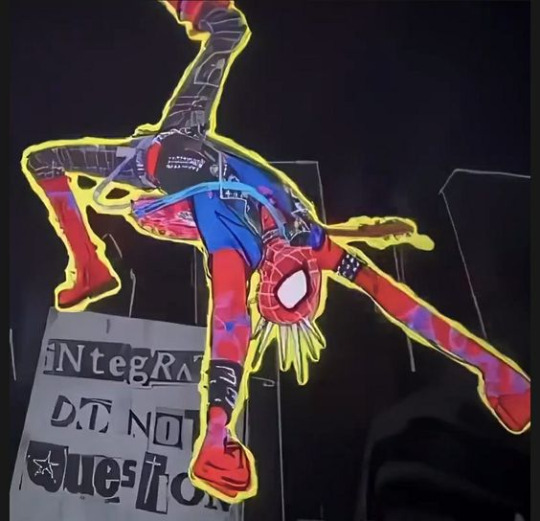

Clueless about punk? Know nothing about the 70's? Or wanna learn more? Start here!
In the last part I examined Anarchy and what makes Hobie Anarchy personified. And next, I think it's only natural to turn my attention to the thing that makes Spider-punk - punk.
In this part I'm examining what punk is, why the movement was created, what punks believe, and what they stand against.
This is an analysis of Punk, 70's History, and why it makes Hobie who he is.

______________________________________________
Punk -
What is it? What 'makes' you a punk? And should Punk be Gatekept?
Punk can be hard to define - and that's by design. With the whole 'hates labels' thing considered, it's understandable. It may be easy to feel like punk as a concept is confusing, or daunting to even grasp.
But remember, Punk is made for the people - and it's made to be accessible and understandable to all people, of every class and ability - so I hope I can help!
Punk as a Subculture
What is a sub-culture? Is a sub-culture the same as an aesthetic?
Punk is a 'sub-culture' - a specific type often called a 'counter-culture'.
In basic terms, a subculture is a lifestyle.
Goths, Punks, Vegans, Nudists, Surfers and even things like the LGBTQ+ community are considered subcultures.
Subcultures effect many things such as they way you dress or your taste in music, and your hobbies. But subcultures can also effect things like your morals, political affiliation, identity, behaviors, and the spaces you exist in.
Subcultures are usually based around morals (Veganism, Punk, Straight Edge.), hobbies (Surfers, Stoners, Ravers), or identities (LGBTQ+ and African-American culture).
By engaging in activities, a manner of dress, or a patter on behavior in a subculture, it becomes is way to outwardly express your beliefs and feelings - while also connecting with people who feel the same.
For example - Although Surfers are united through a hobby in specific, it'd be safe to assume that a surfer would, naturally, be pro-conservation, pro-animal rights, and anti-pollution. A surfer that promotes ocean trash dumping seems weird, right?
That's because the surfer subculture has a political identity defined by the movement's past. Although a surfer surfs - what makes them a 'surfer' as a opposed to 'someone who surfs' is their participation in a culture that includes other things besides surfing, such as music, dress, and even the way they live - like choosing to live beach side or convert to vanlife, choosing to live off very little, etc. They may do some or all of those things, but all their core, what makes them a 'surfer' is their hobby, beliefs, and dedication.
The same way the Surfer 'Lifestyle' is more than just surfing, the Punk 'Lifestyle' is more than just music.
Punk is a subculture, a counterculture specifically. But what does that mean?
What's a counter-culture?
A counterculture is a subculture that arises to directly challenge a societal norm.
Not all subcultures are countercultures; but a lot are.
For example - Drag-racing is a subculture that exists around a hobby. By racing they are engaging in a subculture, but they're not directly trying to challenge society.
Whereas on the other hand - Someone who is Straight Edge is consciously choosing not to drink - and consciously choosing to identify as straight edge in addition the being sober - in order to challenge societal norms and behaviors around drinking and drugs.
Most counter-cultures arise in response to a political event or social development.
Is a subculture and an aesthetic the same thing?
No. Subcultures and Aesthetics differ in one way -
A subculture displays and effects identity. An aesthetic does not.
What I mean is - a subculture effects your beliefs, thinking, behaviors or political alignment. An aesthetic does not.
For example - Hippy is a subculture because it encompasses a thought system. When you see a hippy - its safe to assume that they are anti-war and liberal. A 'republican hippy' seems absurd, because inherently, there is a moral and political align attached to the movement.
Whereas on the otherhand - Emo is an aesthetic because it does not encompass a thought system - It is has no moral or political attachments. Although it includes a manor of dress and music the same way hippie may - it lacks moral implication.
Because of that 'republican emo' is not contradictory - whereas a 'republican hippy' is.
Because of this, it usually makes no sense to judge someone based on their aesthetic. On the other hand, as the fashion, music, and style go hand in hand with it's politics, it's safe to assume and judge aspects of someone based on their subculture or counterculture.
Punk is a counterculture - so it inherently has moral connotations - tied directly to the historical events the influenced it.
While someone being emo may not tell you much about who they are as a person, Hobie being a punk can tell us a lot about who he is!
[I talk more about Punk, subcultures, and aesthetics here.]
Now that we understand countercultures and their function, let's look at punk in specific.
Punk - Basic Roots & Definition
By objective definition:
Punk is a counterculture that developed around the 1970's primarily in the cities of London and New York.
Made up of almost exclusively of lower- and working-class folks of all ages - the movement grew in response to a couple of different political events throughout the 70's, all of which shaped the message and lifestyle that would become punk.
Mainly centered around government corruption, surveillance, and anti-communism in the Western World, these events inspired a movement of anti-government, anti-war, anti-surveillance, and anti-capitalism.
With World War 2 ending in 1945, the world was left in a world divided between capitalism and communism.
With the start of The Vietnam war in 1955 (don't fret, I'll explain), average people were growing tired of the seemingly endless wars, and the corrupted, secretive governments that commanded them.
This gave way to the hippy movement - an anti-war counterculture centered around radical peace and pacifism. But as the Vietnam War stretch through the 60's and into the 70's, the hippy movement and it's pacifism waned.
As the CIA began to squash protests, and Western governments engaged in more corruption and espionage - the pacifism turned to anger, and the outcry turned to music.
What came next was Punk.
Now that we understand the roots of Punk - let's do a quick run down of the historical events that influenced it, and the beliefs that arised from it.
Before we begin, keep in mind that these are all events that Hobie would live through - and have opinions about. Born somewhere between 1958 and 1961, and living in 1978 (according to his intro mugshot) - all of these things would have an effect on Hobie, the way he was raised, and the struggles he had to face.
All of them have a really cool influence on Hobie and the punk movement, so let's take a look -
1978 Punk - Basic Historical Events & Beliefs
The Vietnam War (1955 - 1975) - A war between the Communist North Vietnam and Capitalist South Vietnam. In order to ensure the spread of Capitalism, the United States government crossed the globe into foreign borders in an attempt to secure victory for North Vietnam. They committed a LOT of atrocities that still effect the Vietnamese people to this day. In addition, The US government participated in drafting during this time.
Eventually, the Communist Resistance proved victorious, and the country of Vietnam is currently communist.
Resulting Punk Belief - Anti-Capitalism, Anti-War, Anti-Colonialism, Anti-Draft, Pro-Communism, Pro-Armed Resistance (in response to North Vietnam's armed victory.)
The Rise of Margaret Thatcher (1975-2013) - Often called the most hated woman in all of Ireland and probably the UK too, Margaret Thatcher is one of the most influential British Prime Ministers of all time.
Leader of the 'Tories' (Short for Conservative) since 1975, Margaret Thatcher took office in 1979. Which means in 1978 - when Hobie is - she would currently be running her campaign for Prime Minister.
Margaret Thatcher largely contributed to the unrest and conflict within the British-occupied Northern Ireland, as well as hardship within the working-class in her own country. Even though she left office in 1990, it can easily be said her damage lasted until the day she died, and even beyond.
When Hobie says he hates the PM. He without a doubt means her.
Resulting Punk Belief - Anti-Government, Anti-Conservative, Anti-Colonialism, Pro-Armed Resistance (in response to the Irish Republican Army)
The Civil Rights Movement - It can be hard to believe that Hobie's life overlaps with that of the Civil Rights Movement - but it does!
With Malcom X's assassination in 1965, MLK's assassination in 1968, and Fred Hampton's (Black Panther Party) assassination in 1969 - regardless of how you age him - Hobie's childhood was largely characterized by the death of many Civil Rights Leaders in America.
Even despite being British himself, Hobie would directly face this for much of his childhood - as racial segregation was legal within the UK until 1965 (around the time he'd be 4-7, if you age him 17-20).
However this era was also characterized by the rise of Black culture in media, whether it be Disco, Ballroom, The Black Panther Party or Blaxploitation Movies.
Resulting Punk Belief - Starch Anti-Racism, Extreme Race Solidarity, Affirmative Action, Black Pride
Queer Liberation Wave 1 (1969-1979 and onward) - After spending years as an oppressed, underground subculture Queer Identity and it's liberation came to limelight throughout the 70's.
The 70's began and ended with two of the most important events in Queer History - The Stonewall Riots and The White Night Riots.
In 1969, New York City police officers raided and brutalized patrons at a popular pub called 'Stonewall'. Many trans people as well as a number of drag performers were being arrested for cross-dressing, which was illegal at the time. Stormé DeLarverie - a mixed-race drag king and butch lesbian, called out in anger and desperation at a crowd of onlookers, which incited the riot that is known as the beginnings of the Queer Liberation Movement.
Stonewall Inn still exists until this day - and a year after it's anniversary - the first ever pride parade was started in NYC.
Ten years later in 1979, a man named Harvey Milk was running for office in California. An openly-gay man and activist, Harvey was assassinated by a man named Dan White.
When Dan was only lightly sentenced for this however, 100k people marched for Harvey's justice - sparking a night of violence and direct conflict with the police.
Resulting Punk Belief - Anti-Police, Anti-Justice System, Anti-Bigotry, Anti-Homophobia, Queer Liberation
Other notable historical mentions that are just as important but probably too complicated and/or boring for me to talk about:The Cold War (1945 - forever probably) - The on-going and ever-evolving power struggle between Capitalism and Communism, The West and The East, and nuclear warfare. Yay. Particularly heated due to the Vietnam War, and conflicts in the Middle East.
The Watergate Scandal and the Nixon tapes (1972) - The Nixon administration gets caught wiretapping an opponent's office. Nixon is caught on tape trying to cover this up. Tapes are leaked. Nixons resigns.
The War on Drugs (1971 - forever probably) - The Nixon administration ignites 'The War on Drugs', a campaign for strict criminalization of drug use. Although a ploy to 'clean up streets' it's backwards logic actually led to more extreme drug conditions. In addition, it also overlapped with the CIA distributing cocaine and crack into Black communities in the 1980's so.... yeah the drugs won the war.
So, What does any of this have to do with Hobie Brown?
And Can Hobie be written better?
Now that we have a better understanding of the world that raised Hobie, when we look back at him, we can get a lot clearer view of who he is and what he probably believes.
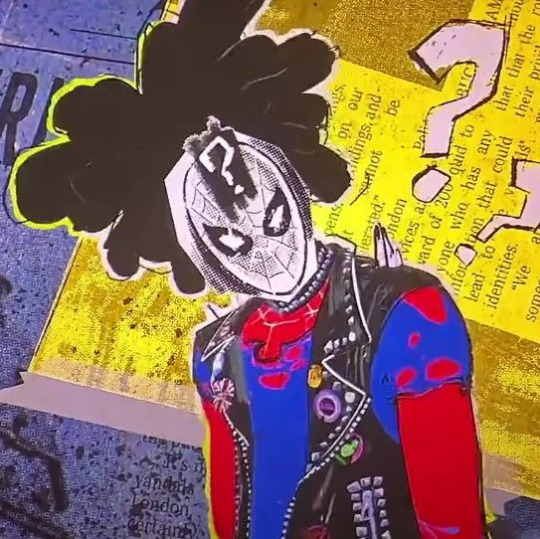
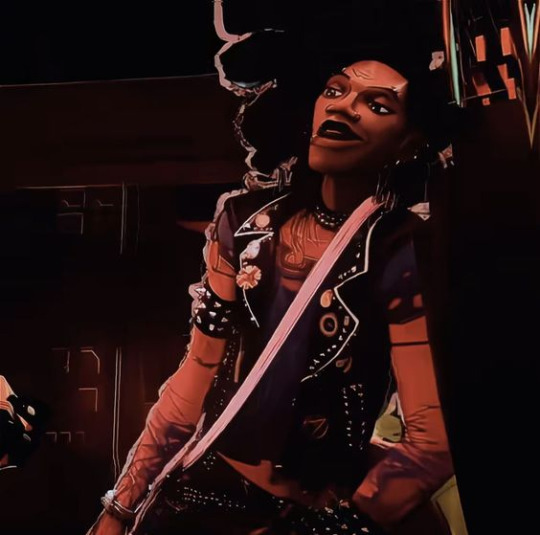
[And if you need a second to look at him after reading this far I completely understand I do too here ya go]
With all that in mind, we can say:
Being born somewhere between 1959 and 1962, Hobie Brown is a black guy raised in an era of persistent conflict, growing conservatism, and on-going social change. His existence is resistance in and of itself.
History-wise:

Raised in the 60's and coming-of-age in the late 70's - Hobie's life has probably been characterized by persistent war, and a generation who met it with radical kindness and compassion.
Although Hobie is a punk himself, Punks and Hippies have roots in the same places and concerns - albeit it different approaches. But at their cores, they're about freedom - and compassion towards others who need it most.
Hippies centered their movement around kindness and non-violence, but also action through resilience, community, and peaceful protest. And Hobie may not believe in non-violence (which - he doesn't. He believes in violence let's be clear.) we can still see the influence of Hippies on his upbringing and behavior.
Throughout ATSV, Hobie's action are motivated and based on resilience within the face of an oppressive institution, and his actions of protests are direct ones - they're indirect, such as building community between him, Miles, and Gwen. His methodology is one of gaining intelligence and destabilizing from the inside.
Race-wise:
To put it blatantly, as this something I feel like isn't highlighted about his character enough-
Hobie would have direct and real experience and trauma around his race based on the time he's from.
And without a doubt, his race would be something he has a lot of pride in.
Hobie would be very vocally proud to be black.
For once, Hobie without a doubt would be raised in a time where racial discrimination and segregation was legal for the beginning of his childhood. He's raised by black people who have lived with this segregation and abuse for all of their lives. And despite the illegalization of segregation in 1965, many racist attitudes would still persist to his modern year.
But, this is Hobie we're talking about. Hobie also was raised in a time where pride in a black identity was stressed at every turn. He's a black guy in 1978. He has wicks. Those two things connect.

When you see his leather vest, your first thought may connect to Sex Pistols, or UK punks. But Black Panthers - a movement that existed all throughout his life, wore leather jackets just the same.
I believe the Panthers influence Hobie a lot too. Many know the Panthers for their direct conflict with police - and Assata Shakur (Tupac's Aunt) being a member.
But the Panthers were also ALL about community. In fact, they started a program to feed inner-city kids breakfast and lunch throughout summer. Many are still going across the country. {As a child, this program fed me and my schoolmates :) }
Hobie takes after them. He sees a younger black child in need of help, and he takes a break from fighting to help them, mentor them, and teach them about the cause. Hobie would absolutely have a Black Panther pin on his jacket!
This is something that is really just brushed over in fanfic and fandom and I'm hoping to write a piece about how to better characterize him because of this - but from here, let's keep this in mind!
Political-wise:
Hobie lived in a time of extreme change, progress, and political development. And to some, his methods may see just as extreme.
But now that we have a context for who he is and who he exists as, lets me transparent about it.
Growing up post-Hippy era, during the rise of conservatism in Britain - as a low-classer class black kid - Hobie's attitude towards activism would differ than those before him.
As most of the adult population seemed numb to war, and most of the Hippy subculture disbanded, outward rebellion and resistance would look a lot more pro-active in many ways, but just as thoughtful.
Hobie is very clearly an anarchist, but considering the political sphere of communism during the time as his behavior towards Miles and Gwen - I do believe he'd support communism, with anarchy being his primary stance and focus.
I honestly believe that Hobie would be pro-armed resistance. As Northern Vietnam and the IRA defended their homelands from foreign invasion, and the Black Panthers armed themself with guns against brutal police forces - Hobie's life would be colored with resistance through armed means.
Hobie uses his guitar as a weapon, both musically and physically, and he carries it openly. He doesn't need to do this. He's Spider-man. He choses to do this. I think Hobie would approve of the oppressed arming themselves, and that's why he does it himself.
And of course, he's anti-police or any form of military, militia, what have you. They are the arm of the state and exist only to target civilians with their will. I believe he would have no sympathy for police - as actual punks in his era had no sympathy for police. [And if he did (he doesn't) he'd be directly shunned by every other punk for doing so, because wtf.]
But out of respect for the actual punks who inspired him, the Black activists brutalized, the queer people targeted, and all those who suffered under oppressive policing during this era (many of which are still alive and maybe even our parents), lets all agree Hobie outwardly and vocally hates police.
For many reasons. Many reasons personal and influenced by direct experience with him, or people he cares deeply about.
Please keep that in mind. It's quite literally impossible for Hobie to not be affected by these events to some extent.
Personality-wise:
This will be expanded in the next part - and of course this is just my opinion, but personality-wise, I think:
Hobie is very politically educated and dedicated. And I feel like this is another thing that isn't highlighted enough or shown enough in fandom.
Hobie's morals, behavior, and methodology doesn't come from nowhere - and although they may be expressed in the music he listens to, the music itself is not the source.
It comes from direct experience with political action outside of being Spider-man.
Based on his deep understanding of anarchy and punk, we can guess that Hobie's very well-read, particularly in history and social theory. Both the IRA and North Vietnam were Marxist-Leninist, so it wouldn't be far of a leap to say that Hobie could be anarcho-communist.
Hobie would absolutely take the time to read - things like the Communist Manifesto, the Black Panther literature and other things.
In my opinion, from all of this - I can only assume Hobie is a reader, an avid one. He without a doubt participates in direct action outside of being SM - such as attending an anarchist/communist union, attending protests out of costume, organizing and planning meetings with other leftists, collecting and gathering supplies and food for those in need, squatting and securing housing for the homeless, and a lot of other things punks that aren't Spider-man do.
It kinda wouldn't make sense for him not to. He was a punk before he was Spider-man.
When Hobie isn't being Spider-punk, and he's being a normal punk - if we try to consider how he spends his free time, a lot of the time our instinct is to imagine him and band. And that's a large part of Hobie.
But all of this is too. These are all things Hobie enjoys, because Hobie enjoys helping people. When Miles breaks free from the society, he's happy for him. It's all he wants.
_____________________________
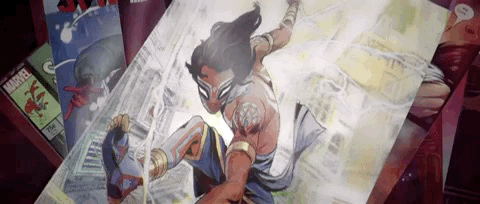
When we genuinely put Hobie into these scenarios, it really helps to humanize him. We can all see the depth in his character, and that depth comes from a real, genuine place.
Like a punk opposing the draft, Hobie opposes the oppressive leader that mandates the trauma of youth. Like a Black Panther with their afro, Hobie wears his hair with pride.
All of these events contribute to him and who he is, and he shows it with everything he does and chooses to be.
I hope understanding these events helps you understand Hobie and his motives more - and I hoped this post helped you understand the history of punk more!
-------------------------------------------------------
This is UNGODLY long - and ungodly wordy. But if you read this far, thank you! And I hope it helped at all! If you learned anything or have any questions, please let me know! I'd love to hear your thoughts, insights, revelations, etc. As you can probably tell I love rambling about Hobie and I'm totally normal and functional and not at all obsessed.
Please stick thoughts of Hobie Brown in my enclosure. I promise I'm normal about him. Thanks again!
#honey wake up its 12am and a new analysis just dropped#let me know if you read till the end!#this SPENT me i hope this makes sense#hobie brown#spiderpunk#spider punk#atsv#across the spiderverse#across the spider verse#spiderman#spider man#miles morales#gwen stacy#atsv analysis#marvel#itsv#hobart brown#Hobie Brown Punk Playbook
594 notes
·
View notes